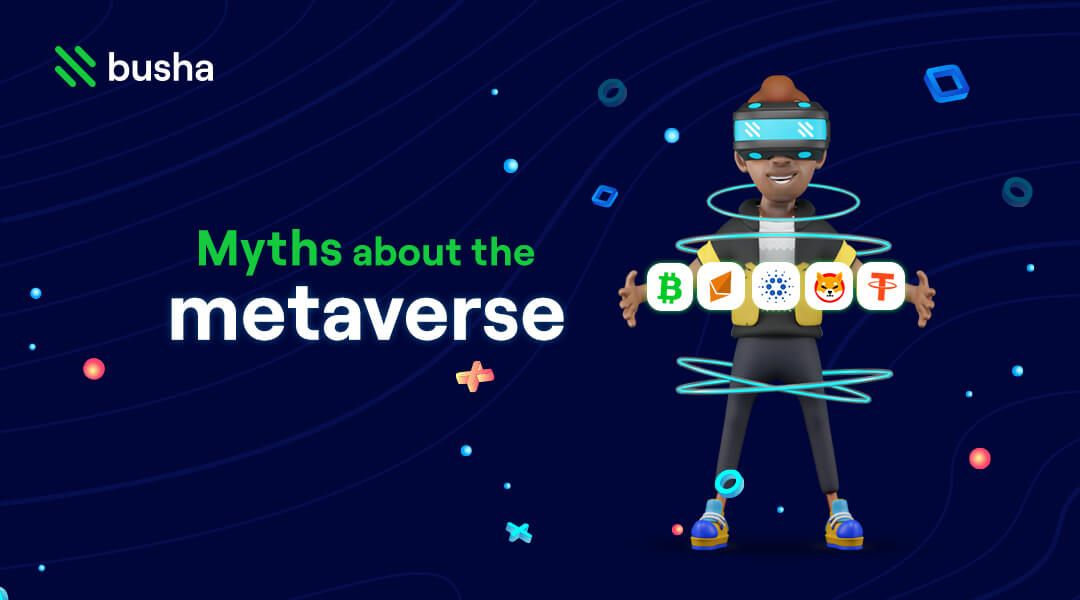
7 Myths about the Metaverse
Despite our growing imagination for “Ready player one” or “Jupiter Ascending” earth, the fact remains that the earth is home to physical matter, interactions, communication and the bulk of survival depends on everyday physical activities between living things and nature.
Sorry to burst your bubble, but there’s no metaverse without the actual universe. Follow us on a short journey to debunk a couple of metaverse myths.
1. Reality will get replaced by the Metaverse.
NO! It won’t and you shouldn’t sell your entire physical assets or properties just to afford a parcel of virtual land, digital assets, or a pair of VR headsets. Building an advanced future on technology opportunities like web3.0, NFTs, cryptocurrencies, self-driving cars, and virtual reality is one of the many ways to create convenience, expand physical human interactiveness, and most importantly explore new activities from any corner of the world.
2. Facebook, now Meta, own the Metaverse.
Again, the metaverse is a collective idea that explains a network of 3D virtual worlds focused on social connection. Saying Meta owns the metaverse is similar to saying Nigeria owns the earth. The company, with some foresight, only inclined their future aspirations as a big social network with growing technological trends. Hence, their goal is to go beyond the everyday social media interactions we know and progress into more 3-dimensional features to enhance internet communication. The metaverse is home to anyone and everyone, from individuals and communities to multinational brands and governments.
3. Only techies and gamers need this innovation.
If there’s one thing Elon Musk is teaching the world correctly, it’s the interdependence of industries and communities on one another. From his dogecoin pump to SpaceX journeys and, most recently, his purchase of Twitter stock to become a key decision-maker. The metaverse isn’t a one size fits all, but rather “one size for all”. Medical services can now be offered in real-time from long distances, forums and business conferences can occur from a simple living room space, new partnerships can be formed without physical contact, consultants can offer professional services without being in the same room as their clients, musicians can perform in virtual concerts, and sports professionals can measure their growth using virtual simulations.
4. Without VR headsets, entry/participation is impossible.
Shhhh… you shouldn’t say this outside. It almost feels like asking the entire world to own an aeroplane to travel to their favorite destinations. The metaverse as earlier explained isn’t limited to virtual reality, but rather a network of technology creating 3D interaction to further expand everyday activities. The goal of the metaverse is to create an escape from reality, socializing and communicating uniquely and exploring places with the use of a smartphone or any device capable of internet connection.
VR headsets play a vital role in increasing sensitivity and perception in certain areas of application.
5. The metaverse is impossible to achieve.
Wrong again! Looking at how far the internet has come, from a read-only interface to a wide network of devices working together to personalize different user experiences, the metaverse is still in its infancy.
With new applications rising and industries adopting blockchain technology, goals for the metaverse continue to increase. Errors will be made in its development, but like every great human endeavor, progress is sure.
6. The elite run the metaverse.
This myth is quite debatable as most new inventions and technologies are funded by wealthy figureheads or conglomerates who see opportunities within a new slice of tech. However, the communities built around growth, sustainability, and expansion aren’t entirely made up of the elite.
Many NFT creators in the African region, crypto exchanges, blockchain enthusiasts, and metaverse critics come from mid-level backgrounds and actively seek out opportunities within the new ecosystem.
7. We are late to the party.
I don’t think so … and here is why:
- Gaming has been one of the earliest metaverse applications and mega-companies such as Epic Games, creators of Fortnite, only began exploring virtual lands and arenas in late 2019 in partnership with celebrities.
- Microsoft is on a goal to transform business and the workforce by creating a digital representation of the physical world in which users can interact through mixed reality
- Meta recently invested $50 million in a non-profit funding group to help the metaverse grow responsibly
- MTN recently bought 144 plots of digital land in the Africarare metaverse Ubuntuland for an undisclosed sum making it the first African company to enter the Metaverse.
Some convincing facts and figures prove how early you are to the party and a tap to take your ideas to the next level.